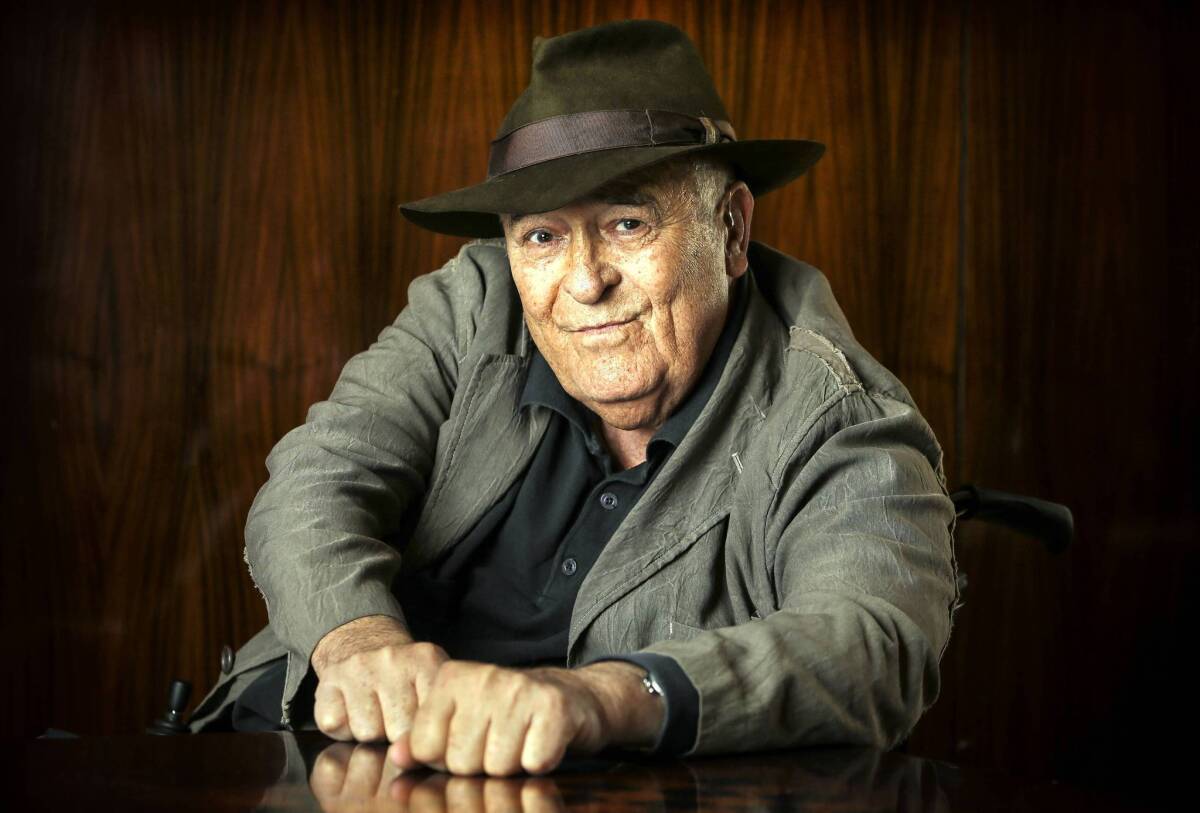Bernardo Bertolucci revisits ‘Last Emperor’ in ‘innocent 3-D’

- Share via
Legendary Italian filmmaker Bernardo Bertolucci is a commanding figure at the age of 73 as his wheelchair rolls into a private dining room at a Beverly Hills hotel. He’s wearing a wide-brim hat and aviator sunglasses, but over an espresso, he proves to be far more charming than imposing.
The Academy Award-winning director is making his first visit to Los Angeles in more than a decade. He’s been using a wheelchair since then following repeated back surgery. For a while he went into a deep depression and became a recluse in his home in Rome.
But in recent years he’s bounced back both personally and professionally. Now Bertolucci, who came to fame in the 1970s with such groundbreaking films as 1970’s “The Conformist” and 1972’s “Last Tango in Paris,” keeps busy on a variety of projects, including making a film and supervising the recent 3-D version of his 1987 classic, “The Last Emperor,” which won nine Oscars, including best picture and director.
PHOTOS: Behind-the-scenes Classic Hollywood
Bertolucci’s been in town for the screening of “Last Emperor” last Sunday at AFI Fest and to teach a master class at UCLA. And Thursday night he and Italian filmmaker Paolo Sorrentino are receiving an award for their work at the opening night of the Cinema Italian Style Festival at the American Cinematheque’s Egyptian Theatre.
(Besides the awards ceremony, the festival will screen Sorrentino’s latest film, “The Great Beauty,” which is Italy’s official entry for the Academy Awards. The festival continues through Nov. 23 at the Cinematheque’s Aero Theatre in Santa Monica.)
Bertolucci said it was hard for him to accept the fact he would never walk again and he feared “this is the end of my work. Maybe I started directing too long ago. Then the moment I decided that I had to accept the condition of sitting, Niccolò Ammaniti gave me his novella ‘Me and You.’”
The intimate drama was tailor-made for a filmmaker with limited mobility — the two-character story was set primarily set in a dingy basement. The film was screened out of competition at the Cannes Film Festival last year and was nominated for six David di Donatello Awards this year in Italy.
Since the film’s release, he’s chaired the jury of the Venice Film Festival and appeared at the Cannes Film Festival in May for the unveiling of the 3-D version of “Last Emperor.”
He had wanted to make “Me and You” in 3-D, but it didn’t work out. So he was thrilled when he was told that someone wanted to transform “Emperor” into 3-D. For the conversion, the expansive epic about Puyi, the last emperor of China, underwent a new digital and sound restoration.
“I was very excited to see this film get a new life,” he said, smiling. “It is an innocent 3-D because it wasn’t conceived in 3-D — there are no temptations to shock like throwing Chinese noodles in your face. It doesn’t distract. It doesn’t interfere.”
As a director, Bertolucci embraces experimentation on the set. It was a lesson he learned from the great French filmmaker Jean Renoir (“Grand Illusion,” “The Rules of the Game”).
Bertolucci had met Renoir in Los Angeles some 40 years ago when Bertolucci was looking for an American actor for his 1976 epic “1900.” “It is when I found Bob De Niro,” said Bertolucci.
“I was somewhere in Beverly Hills and somebody called and said Jean Renoir had seen ‘The Conformist’ and he liked it very much. He was told I was in town. He said come see me. We talked and he was so young. He was 80, and by the way, in a wheelchair. It was like talking to a young New Wave director. He always told me to leave the door open on the set. You know from that door somebody can burst in. That’s the best of cinema.”
Besides “Last Emperor,” Bertolucci is best known for the polarizing drama “Last Tango in Paris,” which received an X rating when it opened in the U.S. in 1973 for its adult, often graphic — for its time — sexuality. Bertolucci earned an Oscar nomination, as did Marlon Brando as an American widower in Paris who has an anonymous sexual affair in a dingy apartment with a young woman (Maria Schneider).
PHOTOS: Behind the scenes of movies and TV
The film ran into censorship problems around the world, and in Italy it was quickly pulled from distribution. Put on trial for obscenity, Bertolucci, Brando and a producer were given a suspended prison sentence and the filmmaker lost his civil rights for five years and couldn’t vote.
The late Schneider never forgave the director for the infamous “butter” sex scene in the film. “It is something that was decided at the last minute,” said Bertolucci. “I told Marlon not to tell her because I wanted to see how she would react not as an actress, but as a woman. I wanted to use her immediate reactions without the filter of acting. That made her so humiliated because I didn’t tell her. I always wanted to apologize to her.”
He and Brando also became estranged for a while after the film’s release.
“That was a mystery,” he said. “When I met him again, he was so nice. But I thought maybe seeing the movie he realized he gave me more than he wanted to. He hadn’t realized how much he gave up of himself.”
More to Read
Only good movies
Get the Indie Focus newsletter, Mark Olsen's weekly guide to the world of cinema.
You may occasionally receive promotional content from the Los Angeles Times.











